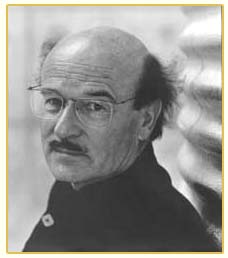|

Claudia Steinberg: Could
you talk about your current project, Max Frischís
"Homo Faber"?
Volker Schlondorff:
The novel starts in Central America and then the hero
goes on a boat trip to Europe and then he travels from
Paris to Athens, crisscrossing Europe.
We just follow his travels. Itís a real road
movie, which is a nightmare for every production manager
who has to book all the flights and hotel rooms and see
that everybody is there all the time. Half the budget
goes into the traveling expenses. Our main actor, Sam
Shepard, doesnít fly, so we
have to drive him everywhere. Right now he is on a train
from his hometown of
Charlottesville, Virginia, to Los Angeles. Heíll get
there in two days. Then weíll
shoot there for a few days and then it will take him
almost a week to go to Mexico,
and from there, heíll drive to
New York, which will take him, we hope, about six days.
CS You did know about that beforehand, didnít you?
VS Yes, I did, but I took him anyhow, because I thought
he was the right choice for the part and it gives me a
little time to breathe in between the different
sections.
CS Sam Shepard will take the boat to Europe?
VS There are no boats anymore, just one freight liner
every week, but it takes two weeks to cross the
Atlantic. On the other hand, he wanted the part so badly
that he agreed to take the Concorde from New York to
Paris. Itís not that he is afraid of flying, he is
afraid of being locked into a machine for hours on end.
Iím just the opposite. At least once a month I go back
and forth from Europe to America. Thatís
what I have done for the last five years and jetlag is
my permanent condition. However,
I do have the highest esteem for someone, who says, ďI
have the same number of years to live as you do but Iíll
take my time moving from one place to another.Ē I think
he is working in-between, especially when he is on a
train, he can write well.
CS How does it feel to work with Shepard, an actor who
is also a serious writer?
VS It is very comforting to have him on the set. I wrote
the screenplay myself with Rudi Wurlizer, adapting it
from the novel, but in English, a language that is not
my own. So to have a writer there, who does not respond
as an actor to the material but as a writer is quite
reassuring.
CS Would you allow him to make any changes?
VS I trust his instincts, but you donít change on the
set, because youíre just too busy making your movie. But
in the weeks of preparations and rehearsals,
he did not actually rewrite any of the dialogue. He
pointed to areas that he thought were strongÖ he
stimulated us.
CS Max Frisch, the author of Homo Faber, wanted you as a
director for his book?
VS He had been selling the rights to this book for 25
years, so it was always being optioned by someone and I
think he kind of gave up on it. It was a very
contemporary novel when it first appeared in 1957 and
now it is like a period piece. You have to have the
right cars and the right costumes. It might as well be a
film playing in the 1900s. We went to Italy, to France,
and we will have to change every street, every piece of
writing on the wall, every neon sign, and the
furnishings in the restaurants.
CS Is Homo Faber also done by an American producer?
VS No, itís strictly a European production, a
French/German co-production.
CS Did Max Frisch have any input as far as the
screenplay is concerned?
VS He is a very demanding writer and wouldnít give the
rights without regards to the screenplay. But I always
love to consult with the writer anyway. |